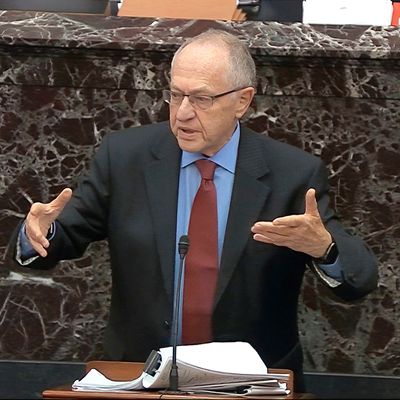
Alan Dershowitz, one of the members of President Trump’s legal team, has an odd habit of using the reductio ad absurdum technique to his own arguments. Dershowitz argues that “abuse of power” is not a category of behavior that can be impeachable. He admits he previously believed the opposite, and that the vast majority of constitutional scholars believe the opposite, but claims to have delved into it and discovered that they are all wrong. Dershowitz has conceded that even if Trump handed Alaska over to Vladimir Putin, that would not be an impeachable offense.
Speaking in the Senate trial Wednesday, he managed to express his own principle in an even more absurd fashion. “If a president does something which he believes will help him get elected in the public interest,” he said, “that cannot be the kind of quid pro quo that results in impeachment.” So any abuse of presidential power designed at least in part to aid his own reelection is not impeachable.
What if the president were to pressure foreign governments to imprison members of the opposing party if they pass through their territory? Or withhold disaster aid from a governor unless that governor announces an investigation of the president’s rival? Offer pardons to anybody who kills his opponent? If it helps the president win, then you can’t impeach.
Trump’s authoritarianism has many enablers, but Dershowitz is the most curious. Dershowitz claims to have flocked to the cause because of his “civil libertarian” principles, which have led him to cede to the president vast authority to ensconce himself in power. He has little evident motive, either financial (yes, he can sell books to trump fans, but he could alternatively sell books to Trump haters) or ideological (he agrees with Trump’s Middle East policy, but disagrees with other Trump policies). Most strangely of all, Dershowitz appears intent on denying that he is doing what he plainly is. He compulsively insists he is not a Trump partisan, however obvious it may be that he has become one.
Dershowitz has fervently denied that he is even “a member of Trump’s legal team.” He then conceded he would present arguments about impeachment, and then tried to clarify that “I’m not part of the regular team that will be making strategic decisions and participating in questions about whether there should be witnesses or not.” Whatever picayune distinction he had in mind, Dershowitz has delivered remarks opposing impeachment as part of the time allotted to Trump’s defenders. And there he was today, sitting at the Trump defense table, answering questions on Trump’s behalf along with the other lawyers who did admit to being on his legal team.
The same bizarre hairsplitting tendency came up again in yet another moment of Dershowitzian set-piece theater. The saga began Friday, when Secretary of State Mike Pompeo bullied and then lied about NPR correspondent Mary Louise Kelly (falsely claiming she had asked questions on a topic she had promised not to touch, and then falsely claiming she had failed to locate Ukraine on a map after he demanded it). Pompeo, caught in his lies, retaliated by throwing a different NPR reporter off a State Department plane.
Tuesday, a delighted Trump congratulated Pompeo for this behavior. “That was very impressive,” Trump told an audience. “That reporter couldn’t have done too good a job on you. I think you did a good job on her!” Dershowitz, sitting behind Pompeo, leaned over to pat him on the back as Trump congratulated him.
Appearing later that evening on CNN, though, Dershowitz denied that he was joining in the congratulations. He did it “because I like Pompeo’s views on the Middle East,” he explained. “I thoroughly disapprove of the way he reportedly treated a reporter. I don’t think reporters should ever be treated that way, and I don’t think presidents should ever say it’s a good thing to do that.” When it was pointed out that he patted Pompeo on the back while Trump was praising his mistreatment of a reporter, Dershowitz laughed it off. “I think you’re reading too much into that. I have patted him on the back a dozen times when we’ve talked about the Middle East, so that’s what my pat was intended to encourage.”
It was characteristically Dershowitzian. The thing you saw transpire on television did not actually happen, or at least it didn’t mean what everybody on all sides thought it meant. Even though Dershowitz’s actions plainly conveyed one meaning — congratulating Pompeo for bullying the press — in Dershowitz’s mind, it meant something altogether different. In his mind his actions followed a principle completely disconnected from the drama in which he had participated.






























